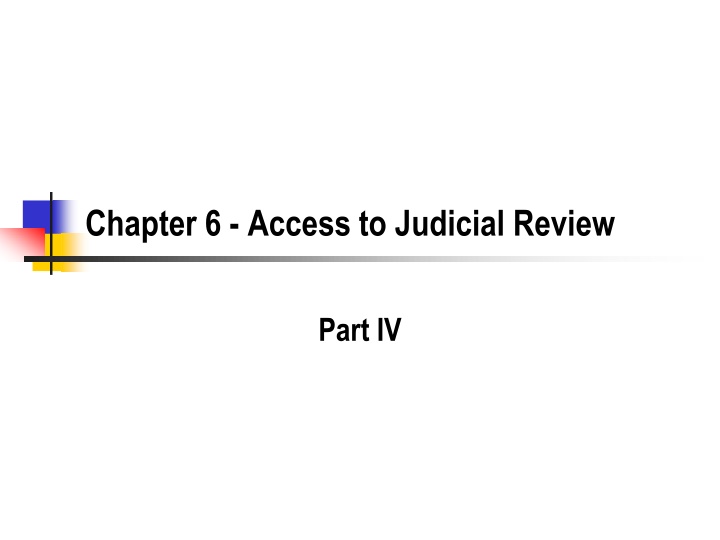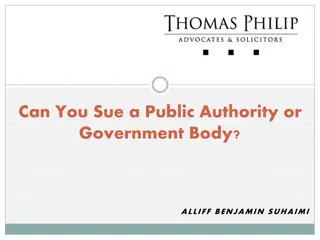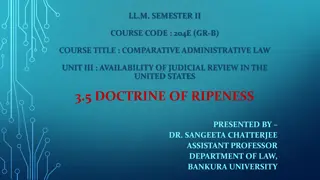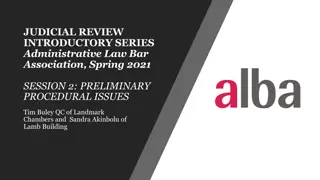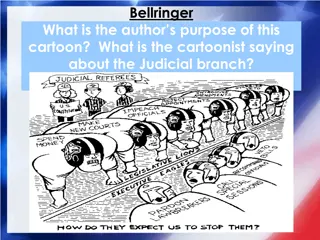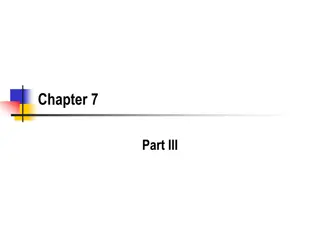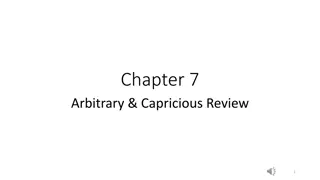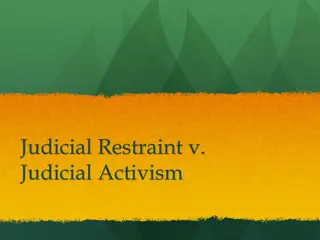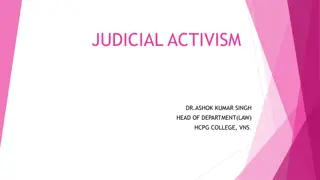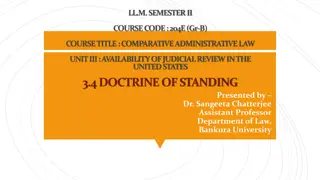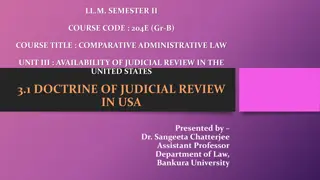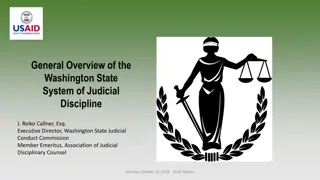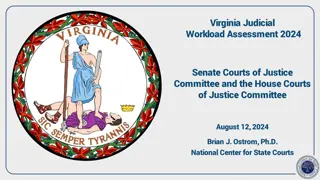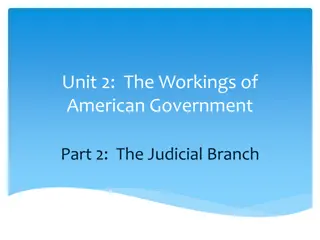Chapter 6 - Access to Judicial Review
This text explores the concept of issue exhaustion in rulemaking, discussing when parties can object to provisions during the comment period, analogies to administrative appeals, and the implications of not raising issues timely. It also delves into ripeness doctrine, Abbott case analysis, pre and post-enforcement review considerations, and equitable factors for granting review.
Download Presentation

Please find below an Image/Link to download the presentation.
The content on the website is provided AS IS for your information and personal use only. It may not be sold, licensed, or shared on other websites without obtaining consent from the author.If you encounter any issues during the download, it is possible that the publisher has removed the file from their server.
You are allowed to download the files provided on this website for personal or commercial use, subject to the condition that they are used lawfully. All files are the property of their respective owners.
The content on the website is provided AS IS for your information and personal use only. It may not be sold, licensed, or shared on other websites without obtaining consent from the author.
E N D
Presentation Transcript
Issue Exhaustion in Rulemaking When do parties have a chance to object to provisions in a rulemaking? Should they be required to make their objections during the comment period if they plan to challenge the rule later in court? Is this analogous to an administrative appeal of an order? What if the party did not raise the issue in a comment, but someone else did? 2
Ripeness "The problem is best seen in a twofold aspect, requiring us to evaluate both the fitness of the issues for judicial decision and the hardship to the parties of withholding court consideration." If the case is not ripe, you do not have a case and controversy Ripeness is not codified in the APA, so it remains a jurisprudential doctrine Ripeness is jurisdictional, so it can be raised at any time 3
Was Abbott "Ripe"? In a facial challenge, the court does not need to see how the rule is applied The court must also find that this is a final agency action In this case, the rule required the product labels to be changed without further agency action What is the impact of this regulation? What is the risk of enforcement? 5
Pre and Post Enforcement Review While review is favored, there is no right to review before the agency brings an enforcement actions Plaintiffs asked for an injunction They claimed they could not risk enforcement An injunction prevents the agency from acting Prevents important health and safety measures Enmeshes the court in agency policy making 6
What are the Equitable Factors? (Think injunction standards) Since there is no right to pre-enforcement review, the plaintiff must show the court an equitable basis for granting review, which resembles the factors for granting an injunction Is there an immediate effect of the agency action on the plaintiff's activities? What is the risk of waiting for enforcement? Does the court have enough information to determine the issue? What are the special factors in the drug business? 7
Abbott Rule Where the legal issue presented is fit for judicial resolution, and where a regulation requires an immediate and significant change in the plaintiffs conduct of their affairs with serious penalties attached to noncompliance, access to the courts under the [APA] must be permitted, absent a statutory bar or some other unusual circumstance. . . 8
Toilet Goods Assn. v. Gardner, 387 U.S. 158 (1967) Companion case to Abbott FDA promulgated a rule allowing them to inspect toilet good manufacturers to assure compliance with FDA regulations How is a rule allowing inspections different from the rule in Abbott? Does Plaintiff have to change its behavior? 9
Example: EPA Smoke Spotters EPA says it will use the credible evidence rule to allow visual observation of smoke from a smokestack to be used as evidence that a person was violating its Clean Air Act requirements Plaintiffs contest the action, saying it was beyond agency authority. Is this more like Toilet Goods or Abbott Labs? Do plaintiffs have to change their behavior? 10
Was the Dispute Ripe in National Automatic Laundry? The court found that the dispute in National Automatic Laundry was ripe because the opinion included detailed factual hypotheticals on the application of the doctrine in different situations This gave the court the necessary factual information to review the application Without this detail, the court would have required the plaintiff to wait for enforcement so there would be facts to evaluate. This also makes it look more like a rule. 11
Compliance Orders Revisited After Sackett Sackett found that a compliance order that found a violation and asserted that the clock for a fine was already running was a final agency action, ripe for review. What about this compliance order: The EPA believes that you have violated the CWA by filling your lot. If you are found to have violated the CWA, the penalty includes a $15,000 a day fine. You can remedy this violation by removing the fill and restoring the wetland plants. Is this different from Sackett? 12
What if You Benefit from a Policy that is Being Changed? FDA regulates contamination in foods such as bug parts. These are impossible to completely remove. The agency issues allowable (action) levels, such as 5 rodent hair fragments per ounce. This is a safe harbor, it is not necessarily the safety limit that would trigger sanctions if exceeded. 13
Whose Claim is Ripe? You represent consumers who believe that the new (higher) action levels are dangerous Is the action ripe as to your claim? Can it get riper? What about manufacturers who think the level is too low? How are they different from consumers? What new info might the court get by waiting until enforcement? 14
What if the Agency Changes a Permit Process to Your Detriment? The NRC says it is loosening up the permit process for dumping low level waste Is this ripe? What has to happen before any waste is dumped under this rule? What if the forest service loosens up the permit process for clear cutting, but there must be a timber sale with public input before the timber can be cut? 15
Ripeness Recap Ripeness is the other side of exhaustion of agency remedies Enforcement actions, permits, and other affirmative agency actions against your client If you have done everything the agency requires, then you have exhausted agency remedies Your case is ripe 16
APA - When Can You Go to Court Without Exhausting Agency Actions?
The agency action is unconstitutional or exceeds the agency's legal authority Rulemaking - Facial Challenge How does this differ from a challenge that the record is not adequate? You have to convince the court that the rule does not have a legal application You have to convince the court that your client will suffer significant harm if it must wait for enforcement If you fail, then you have to wait until the agency acts against your client Agency enforcement actions let you go for an injunction or other attack on the agency authority 18
Impossibility of Agency Remedy The agency does not offer the remedy you seek You want money damages and the agency remedies only offer that the agency will stop enforcement actions Congress can require you to still exhaust your agency remedy Having to wait 10 years does not count. The agency is biased against your client Just showing that you are going to lose is not enough Remember from previous chapters how hard this is to prove. 19
Primary Jurisdiction This is related to "Committed To Agency Discretion" In these disputes there is a issue which meets the standard for judicial review The primary jurisdiction question is whether the courts should let the agency resolve the problem first This is important when national uniformity is important, such as automobile emissions standards The court gives the agency the chance to rule for the country before hearing an individual dispute Often resolves the dispute, so no judicial remedy is necessary 20
